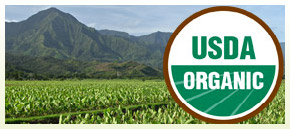The “Small Farm” exemption allows operators with less than $5,000 in gross annual organic sales to legally represent their products as organic, as long as the production and handling practices, record keeping, and labeling comply with the organic standards and regulations. These products can only be represented as organic when sold raw or processed by the original producer and are not allowed to be used as ingredients identified as organic in processed products produced by another handling operation.
Regulatory text of the Exemption is below for reference.
7CFR Part 205 National Organic Program (NOP)
§205.101 Exemptions and exclusions from certification.
(a) Exemptions.
(1) A production or handling operation that sells agricultural products as “organic” but whose gross agricultural income from organic sales totals $5,000 or less annually is exempt from certification under subpart E of this part and from submitting an organic system plan for acceptance or approval under §205.201 but must comply with the applicable organic production and handling requirements of subpart C of this part and the labeling requirements of §205.310. The products from such operations shall not be used as ingredients identified as organic in processed products produced by another handling operation.
(2) A handling operation that is a retail food establishment or portion of a retail food establishment that handles organically produced agricultural products but does not process them is exempt from the requirements in this part.
(3) A handling operation or portion of a handling operation that only handles agricultural products that contain less than 70 percent organic ingredients by total weight of the finished product (excluding water and salt) is exempt from the requirements in this part, except:
(i) The provisions for prevention of contact of organic products with prohibited substances set forth in §205.272 with respect to any organically produced ingredients used in an agricultural product;
(ii) The labeling provisions of §§205.305 and 205.310; and
(iii) The recordkeeping provisions in paragraph (c) of this section.
(4) A handling operation or portion of a handling operation that only identifies organic ingredients on the information panel is exempt from the requirements in this part, except:
(i) The provisions for prevention of contact of organic products with prohibited substances set forth in §205.272 with respect to any organically produced ingredients used in an agricultural product;
(ii) The labeling provisions of §§205.305 and 205.310; and
(iii) The recordkeeping provisions in paragraph (c) of this section.
(b) Exclusions.
(1) A handling operation or portion of a handling operation is excluded from the requirements of this part, except for the requirements for the prevention of commingling and contact with prohibited substances as set forth in §205.272 with respect to any organically produced products, if such operation or portion of the operation only sells organic agricultural products labeled as “100 percent organic,” “organic,” or “made with organic (specified ingredients or food group(s))” that:
(i) Are packaged or otherwise enclosed in a container prior to being received or acquired by the operation; and
(ii) Remain in the same package or container and are not otherwise processed while in the control of the handling operation.
(2) A handling operation that is a retail food establishment or portion of a retail food establishment that processes, on the premises of the retail food establishment, raw and ready-to-eat food from agricultural products that were previously labeled as “100 percent organic,” “organic,” or “made with organic (specified ingredients or food group(s))” is excluded from the requirements in this part, except:
(i) The requirements for the prevention of contact with prohibited substances as set forth in §205.272; and
(ii) The labeling provisions of §205.310.
(c) Records to be maintained by exempt operations.
(1) Any handling operation exempt from certification pursuant to paragraph (a)(3) or (a)(4) of this section must maintain records sufficient to:
(i) Prove that ingredients identified as organic were organically produced and handled; and
(ii) Verify quantities produced from such ingredients.
(2) Records must be maintained for no less than 3 years beyond their creation and the operations must allow representatives of the Secretary and the applicable State organic programs’ governing State official access to these records for inspection and copying during normal business hours to determine compliance with the applicable regulations set forth in this part.




